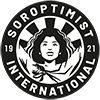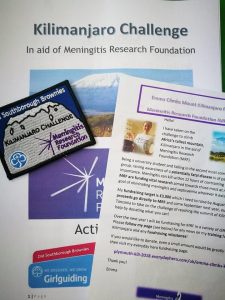We are sponsoring:
St John’s Tunbridge Wells Rangers:
February 2019:We have sponsored a local Guide Group of Rangers, from St John’s Tunbridge Wells, to participate in an activity for World Thinking Day in Brussels – February 22nd-24th .
‘This is the first international trip for all 6 girls taking part and will be a challenge for them as some have never been abroad before! ‘
A full report will follow on their return.
Emma Acton
Update: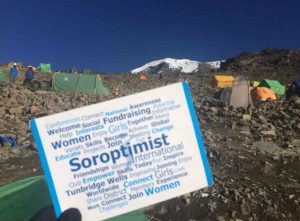
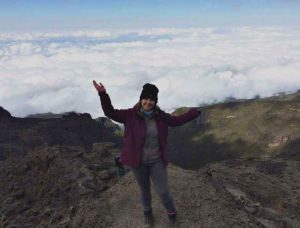
Emma, who is from 2nd Southborough Brownies where she is a leader, is climbing Mount Kilimanjaro in aid of the Meningitis Research Foundation. As part of her fund raising she has created the Kilimanjaro Challenge badge and an activity pack for Brownies, Guides and Rangers to follow to understand more about Trekking, African Culture and Meningitis and Septicaemia.
Emma is currently at University and when she returns from her challenge and between studies she will be coming to talk to us at our club meeting to talk about her experiences both on her expedition and as a brownie leader encouraging young girls.
Here is the link to her sponsorship page :Emma Climbs Mount Kilimanjaro
At our club meeting in January 2018 it was decided that we would sponsor the United Nations Association UK to enable future productions of their magazine The ‘F’ Word. We have sent a financial donation. Here is a link to the current edition:
United Nations UK The ‘F’ Word
International Services:Ghana with Charlotte Bartholomew

Charlotte is undertaking a 3 month project in Ghana. She will be working alongside other 18-25 year old volunteers from the UK and Ghana to research, plane and introduce community-based projects in Sexual Health education for women and children. International Service aims to empower women, children and young people and people with disabilities to access their rights in developing countries across the world. Charlotte will be living in host homes in the community for the duration of her time in Ghana and will be sending reports of her experiences and challenges she faces which we will be sharing on this page.
On her return, Charlotte will be visiting the club to speak about her time in Ghana.
We wish you a very safe journey and look forward to receiving updates on your International Citizen Service.
Updated May 2018
The parcel has now arrived safely and complete in Ghana and Abigail is delighted.
Updated April 2018
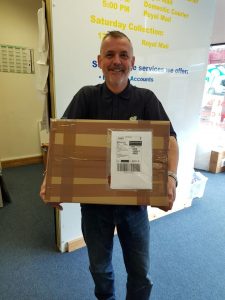
The stationary we collected as a Club is now on its way to Ghana. Below is a small selection to illustrate the type of donation we have made.
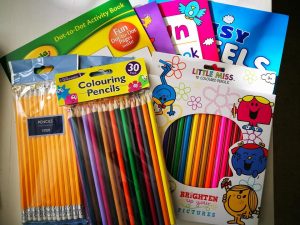
Updated January 2018
We were delighted to welcome Charlotte home and in January at Club she made a presentation detailing her experiences in Ghana.Charlotte has been inspired by Soroptimist SIGBI and the support we have given her by telling her story through our Social Media and Website and so has decided to join us and become a Soroptimist. We look forward to welcoming her as a full member in February. Charlotte will be our youngest member. Sponsorship isn’t always about money, it is also about mentoring and support, we, as a club, are committed to helping women, young women and girls express themselves and increase confidence and self-esteem in this changing World.
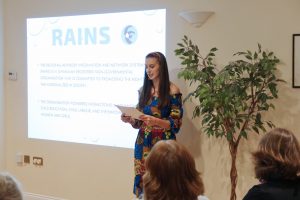
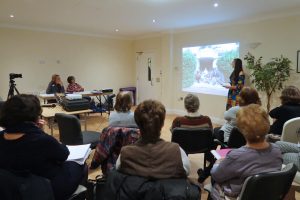
Update 11/11/2017
Here is a picture of Charlotte with some peer educators in the Zokuga community holding the Soroptimist postcard. Charlotte says ‘We are working with these peer educators to try and find and train more female peer educators to help with the assistance of sexual health education in their community. They are all on board with the work to improve the amount of girl children attending school.’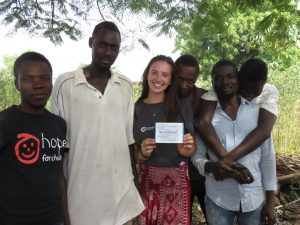
Charlotte has written a blog on the RAINS-ICS blog page which can be accessed here : http://rains.internationalservice.org/2017/11/a-warm-welcome-from-zokuga.html
Update 6/11/2017
On the 2nd November, the team and I went into one of the communities we work with, Nanton-Kurugu in the Savelugu district, to deliver a sensitisation focusing on the sexual health associated dangers of kayayei. Kayayei is a term that describes young women who carry goods and wares for a fee. It is predominantly girls and young women aged between 8 and 45 years, mostly from the Northern regions and rural areas of Ghana. These women have limited or no education and originate from poor socio-economic backgrounds.
The living conditions of kayayei in Ghana have often drawn public sympathy. Media reports have centered on their exposure not only to bad weather and insanitary conditions but harassment from some unscrupulous person who may also be living on the streets. Extortion and sexual abuse are among the problems faced by kayayei living on the streets.
They sleep in the open in plastic covers as protection against rain and mosquitoes. As a result, they indicated they suffer frequent headaches, malaria, cough, high fever and bodily pains. Back pain was also noted a common illness which was attributed to the heavy loads they carry on a daily basis.
The involvement of girl children makes the activity a social problem, particularly against efforts by government and non-government organisations to step up girl child education. Evidently, extreme poverty has pushed many of these children and young women into the activity.
We at RAINS on behalf of International Service believe that kayayei should be targeted due to their position as victims of sexist marginalisation (due to the self-fulfilling prophecy of low socio-economic productivity), who, acting with incomplete knowledge about the process of kayayei, believe it to be a preferable escape from poverty and other cultural hardships (such as FGM, forced marriage).
We counted that roughly 85 people were in attendance. These were mainly aged between 10-17 and equal in terms of male and females. There was also a large group of women in attendance. The session was held outdoors, under the shade of a large tree. Throughout the day, we had two main speakers, one English and one Dagbani translator. Dagbani is the native language of the majority of the Northern Region in Ghana. This helped us to ensure that all of the women and children understood the discussion we were orchestrating.
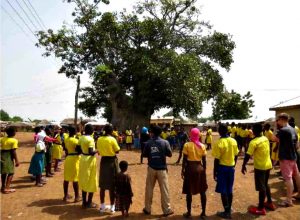
We began the session with a group energizer. This involved getting everybody in a big circle and introducing themselves with a rhythmic game. The children really enjoyed this and it was easy to explain. After that, we began asking them questions on kayayei in order to determine the level of knowledge that our audience had. We asked them a series of questions: what is kayayei, what are the dangers, and why are people vulnerable to choosing kayayei. The women and children worked in small groups and wrote down their ideas on post-it notes, which we then feedback.
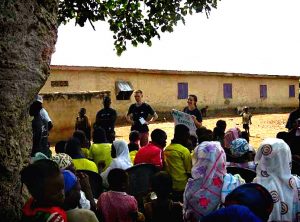
We found that some of the children/teenagers had a basic level of knowledge about kayayei and the associated risks. We were surprised at the number of children who thought it was a geographical place and not a job description, and we will be focusing more on how to find a better alternative to choosing kayayei in terms of teaching communities how to empower their women by providing other opportunities. Other ways in which kayayei can be prevented are:
- Increase access to schooling
- Access to vocational training
- Access to more secure jobs
- Family planning
- Preventing child marriage
- Abolish widowhood rites
- Stop child abuse
- More productive farming
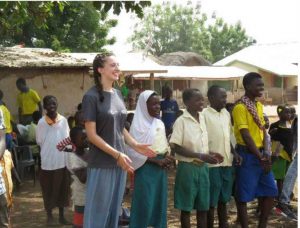
After another fun energiser to keep the children focused, we performed our play on the dangers of kayayei to the group. We had an English UK volunteer narrator, and also had an in-country volunteer to narrate in Dagbani. The children really enjoyed the play, and afterwards were quick to put their hands up and tell us the key information that we included in the play about the dangers of kayayei. This showed that they had a good understanding of the play and it’s an excellent, interactive way to raise awareness.
One issue that we did encounter was the children and adults alike, male and female, laughing at the rape scene. At the time this was quite shocking to myself and my other female UK volunteer but upon reflection, we think this may be because of the ‘taboo’ on the subject of sex. For future sensitisations, we will think about how we can deliver this message in a more serious, emotive manner.
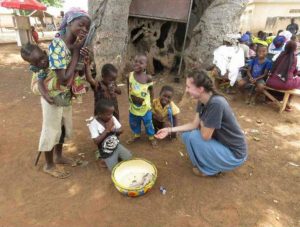
This Wednesday 8th November is another sensitization in the community of Zokuga and this Friday is our first radio sensitization on Radio Tamale, where we will also be raising awareness on the sexual health associated risks of kayayei.
If I have raised any issues or topics that you have any questions about, please don’t hesitate to get in touch and I’ll be happy to provide more information. My email address is charlottebartholomew555@gmail.com.
Update 18/10/2017
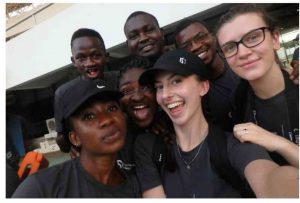
Charlotte with some of her team at the launch of REACT – an International Service project which aims to transform the lives of visually impaired people from Northern Ghana.
RAINS works with communities and development partners to improve the quality of life for vulnerable groups especially children, women, girls and people with disabilities by strengthening local structures to take actions to promote and ensure fairness for all people in Northern Ghana.
Our Vision: A just society that is based on equity with equal opportunities for all and respect for diversity.
The Safe Choices project focuses on facilitating sustainable, localised, sexual health education in order to instigate a reduction in underage pregnancies, and in addition to this we are now hoping to raise awareness on the issue of Kayeyei.
Kayeyei is when young girls flee their villages to the city to find work. Often, there is no work available for many of these girls, and through their vulnerability, they are forced to enter into illegal work, which most commonly takes the form of underage sex slavery. Via this aim, we hope to remove the barriers to socioeconomic progression for impoverished young people.
On Thursday, my team and I will be entering the communities which we will be working with in Northern Ghana: Nanton-Kurugu, Zokuga and Langa. After meeting the chief and introducing ourselves and what we hope to achieve, we will be inviting female peer educators to a training day so that the awareness raising of the above issues remains sustainable and will continue once we have left, through them.
I am on the social media committee for ICS RAINS and have begun editing and uploading informative videos on the work we are doing. If you are interested in following our progress over the next 9 weeks, please follow @ics_rains on Instagram, or ICS RAINS on Facebook.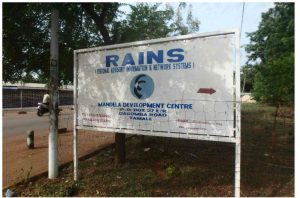
Thank you to the Soroptimists for their sponsorship, and I look forward to keeping you updated along the way!

Here is Charlotte on the start on her journey, early October, leaving the UK bound for Accra.
The organisation Charlotte is with has a Facebook page and their videos and posts can be viewed on-line today 17/10/2017 is our first view of Charlotte in Ghana. Charlotte is in a video speaking about poverty and what it can mean for young girls called Today is the International Day for the Eradication of Poverty. Why not have a look/ listen?
https://www.facebook.com/ICSRAINS/
Tanzania with Laura Barrett
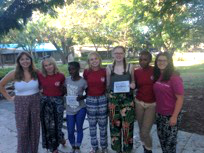
Our new sponsorship initiative:
Tunbridge Wells Soroptimists were delighted to sponsor Cambridge University Student Laura Barrett on her recent secondment to Tanzania. We strongly believe in supporting young women in their endeavours to work overseas and contribute to improving women’s life experiences and issues. Laura very kindly has filed this report and as you can see she is holding a copy of our postcard.
My 6 weeks fighting Tanzania’s sanitation crisis
Currently, over 80% of residents in Dar Es Salaam live in low-income, high density settlements that suffer from a lack of adequate sanitation. The majority of households use pit latrines that crack, collapse and leak. Indeed, the preferred emptying method is simply letting the latrines overflow into the streets during the rainy season – paying a vacuum truck to empty them is a luxury not accessible to most community members. The overflowing sewage in the rainy season aids the spread of disease: 13% of all infant deaths under the age of five in 2015 were due to preventable diarrhoea in Tanzania. The stagnant dirty water from the pat latrines encourages insects such as mosquitoes, leaving people at a higher risk of malaria due to the current sanitation system. Currently, women are left vulnerable since the lack of privacy in the pit latrines can make them feel unsafe or ashamed, often resulting in bathroom trips only in the middle of the night – leaving them a target for sexual violence.
Over the summer I visited Dar Es Salaam for 6 weeks working with the Cambridge Development Initiative alongside students from Cambridge and from the local Tanzanian Universities. We empowered the local community to implement and maintain a simplified sewerage system, an established method for delivering cheap, effective, secure sanitation to those in informal settlements.
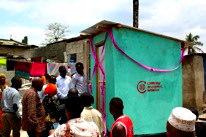
It has pipes allowing the sewage to flow straight out of the toilet, a roof for stopping flooding in the rainy season and a lock for security, privacy and encouraging the families to keep their latrine clean through a sense of ownership of the toilet.
My role on the team focused on community engagement, empowering the locals to take ownership of the project of the project and training them to care for the network once we leave. On top of this we organised workshops and training for the community in health and hygiene practices. Having a good sewerage system is good but won’t be effective without correct behavioural practices.
We worked with a local NGO to run workshops in schools about general hygiene, handwashing, oral hygiene and menstrual hygiene for girls. Education around puberty and menstruation is minimal and so we worked hard to ensure the girls received complete and effective education on this topic. During the trip, a women’s empowerment day was also held to encourage the Tanzanian students to break down any gender barriers that may be holding them back. As a female engineer working in Tanzania I was very proud to be representing women in STEM subjects and show that it’s not a career that women should be deterred from because of their gender.
Thanks to your help and support through my work, I was able to make a huge difference to many lives throughout Dar Es Salaam and am now considering a career in engineering in developing countries. I am so grateful to the Soroptimists for their support, it means a lot to me and I hope you can agree that your donation has gone a long way.
We are very proud of you Laura and hope that you will be able to visit us soon to expand on your experience.
Thank you for sending us this report.

